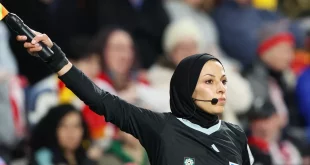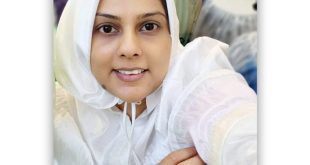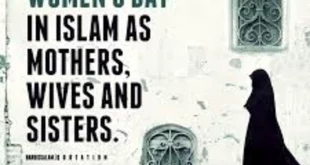 “In Islam, my quest for absolute values was satisfied. In Islam I found all that was true, good
“In Islam, my quest for absolute values was satisfied. In Islam I found all that was true, good
and beautiful and that which gives meaning and direction to human life (and death)… My adherence to the Islamic faith is thus a calm, cool but very intense conviction.”
Maryam Jameelah (may Allah have mercy on her, 23 May 1934 – October 31, 2012).
Maryam Jameelah, a prolific writer, and named as one of only two women in the book “100 Great Muslim Leaders of the 20th Century” (2005), channeled her passion and conviction into a successful writing career that has had lasting and widespread
influence in the Muslim world. She is the author of over 30 books and pamphlets, using the medium as a platform to voice her criticism of secularism, materialism, modernism and the West. She has been called “a prominent female voice for conservative and fundamentalist Islam, known for her disparaging writings on the west.” Her works have been
translated into several languages, including Bengali, Persian, Turkish and Urdu. What makes her most influential however, is not her views or her writing per se, but the fact that they came from an American Jewish girl who converted to Islam and immigrated to Pakistan.
Biographical sketch and background
Maryam Jameelah was born as Margaret Marcus in New Rochelle, New York on 23 May 1934. She grew up in a secular Jewish family of German descent in a New York City suburb.
Her family called her Peggy. Her interest in Islam began as a child of 10 when she attended a reformed Jewish Sunday school. She learned about the shared history of Jews and Arabs, the central role of Abraham as the father of both, and the welcoming of the persecuted Jews into Muslim Spain in medieval Europe. She was very disappointed with the congregation, however, who did not take their religion seriously and especially the children who were unruly and ridiculed the rituals. Moreover, her immediate family treated Jewish holy days as occasions for parties and celebrations instead of solemn religious observances, and they eventually joined an agnostic humanist organization.
As a child, she loved music, and one day she happened to hear some Arabic music on the radio and was instantly enchanted. She begged her parents for records until they gave in. Her interest in Arab culture grew throughout her adolescence, and she became sympathetic to the plight of the Palestinians. She began a novel, “Ahmad Khalil: The Story of a Palestinian Refugee and His Family”, at the age of 12.
As a young adult attending New York University at the age of 19 (1953), she explored various groups and faiths, including Reform Judaism, Orthodox Judaism, Ethical Culture and the Bahá’í Faith, but always left in disappointment. During a course at the university about Judaism’s influence on Islam, and through her meetings and interactions with Arabs and Muslims in New York City, and her own personal study of the Quran and Islam, she became convinced that Islam was the truth.
She left university due to illness requiring hospitalization in 1956 and never graduated. Upon her return home from the hospital in 1959, she continued her study, being influenced by Marmaduke Pickthall’s “The Meaning of the Glorious Koran” and Muhammad Asad’s “The Road to Mecca”. She also began writing for the Muslim Digest of Durban, South Africa and various other publications. On 24 May 1961, at the age of 27, she embraced Islam after a 17-year-long journey and 8 years of intense study, and despite objections from her family and community.
Many reverts, myself included, can attest to the following sentiment:
“I have, I believe, always been a Muslim at heart by temperament, even before I knew there was such a thing as Islam. My conversion was mainly a formality, involving no
radical change in my heart at all but rather only making official what I had been thinking and yearning for many years.”
After her conversion, she changed her name to Maryam Jameelah. She had been corresponding with Muslim leaders around the world, and had formed a particularly strong relationship with Maulana Sayyid Abul Ala Maududi, the founder of the Jamaati Islami (Islamic Society in Pakistan), who shared her ideals. Their correspondence lasted two years
and culminated in his invitation to come to Pakistan in 1961, which she accepted and never returned to the US. She resided in Lahore with his family. Soon after, in 1962, at the age of 28, she married Muhammad Yusuf Khan, a leader in the Jamaati Islami, as his second wife. They had five children together and lived in Lahore, Pakistan. She embraced and relished in the new, simpler, less materialistic lifestyle of her new home – but the adjustment was not without its challenges. She wrote frequently to her parents; these
letters along with other correspondence, her early writings, artwork and other works are preserved in the New York Public Library. She passed away on 31 October 2012 at the age of 78 raḥimahā Allāh (may Allāh have mercy upon her) (may Allāh have mercy upon her). A biography was written about her and her life, called “The Convert: A Tale of Exile and Extremism” by Deborah Baker (released on 4 September 2012, shortly before her death).
Lessons about productivity and conclusion
In Maryam Jameelah’s life, there are many lessons for us.
1. Have sincere intentions and work hard – This is the Productive Muslim motto! She exemplified passion and commitment to her cause, which was driven by her faith. She lived for Allah subḥānahu wa ta'āla (glorified and exalted be He) (glorified and exalted be He) alone and worked for Islam, the ummah and the akhira.
2. Live a simple lifestyle
She was against modernism and materialistic society, and she lived a life of simplicity. She was living her truth and being true to herself – she was walking the walk.
3. Have courage
It was not easy for her to go against her family and community to embrace Islam. She was brave to correspond with well-known leaders in the Muslim world. It also took a great amount of courage to leave behind
everything she knew in the US to migrate to an unknown land, and renounce modern comforts for a simple life in a developing
country where she knew no one, on the advice of someone she had never met.
4. Do not let obstacles stand in your way
She faced hardships of not fitting into Jewish and American social circles in the US, and Pakistani circles in Pakistan. She also suffered from bouts of psychological/mental illness
(nervous breakdowns, despair, exhaustion; and she took medication for schizophrenia). None of this stopped her from moving toward her goal – they merely slowed her down at times.
5. Expand your circle of influence for change
She used the power of the written word, combined with her conviction, to become well known and influential. Her writing is the product of intelligent, critical thinking and presents logical arguments. Perhaps most importantly however, is the fact that her background as an “insider” to American culture, Jewish faith and Zionist organizations lends credence to her arguments. Do you know of any prominent Muslim women who have made an impact on your life? Share this with us in the comments below or send us your story.
About the Author:
Dr. Callista B. Rakhmatov (http://www.callistarakhmatov.com/) is an aspiring writer with a special interest in personal growth and productivity. She is an occasional contributor to ProductiveMuslim.com and is working on several other projects, including a children’s book series she started at the age of 12. Her writing tends to focus on themes important to teenage girls and women and reflects her varied interests. She has a phD in Plant Sciences and works in international capacity building and development work in agriculture. She became a Muslim as a young adult in 1999. She has given talks about the role of women in Islam to churches and engages in other dawah activities. She recently married her soul mate and best friend.
Read more: http://productivemuslim.com/influential-muslim-women-maryam-jameela/#ixzz2JX1sRJPP
Follow us: @AbuProductive on Twitter | ProductiveMuslim on Facebook
 Sri lanka Muslims Web Portal Diversity and Inclusiveness
Sri lanka Muslims Web Portal Diversity and Inclusiveness



